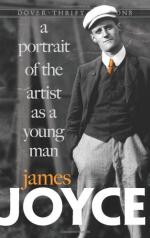—Is it? Stephen said vaguely.
He was watching Cranly’s firm-featured suffering face, lit up now by a smile of false patience. The gross name had passed over it like foul water poured over an old stone image, patient of injuries; and, as he watched him, he saw him raise his hat in salute and uncover the black hair that stood stiffly from his forehead like an iron crown.
She passed out from the porch of the library and bowed across Stephen in reply to Cranly’s greeting. He also? Was there not a slight flush on Cranly’s cheek? Or had it come forth at Temple’s words? The light had waned. He could not see.
Did that explain his friend’s listless silence, his harsh comments, the sudden intrusions of rude speech with which he had shattered so often Stephen’s ardent wayward confessions? Stephen had forgiven freely for he had found this rudeness also in himself. And he remembered an evening when he had dismounted from a borrowed creaking bicycle to pray to God in a wood near Malahide. He had lifted up his arms and spoken in ecstasy to the sombre nave of the trees, knowing that he stood on holy ground and in a holy hour. And when two constabulary men had come into sight round a bend in the gloomy road he had broken off his prayer to whistle loudly an air from the last pantomime.
He began to beat the frayed end of his ashplant against the base of a pillar. Had Cranly not heard him? Yet he could wait. The talk about him ceased for a moment and a soft hiss fell again from a window above. But no other sound was in the air and the swallows whose flight he had followed with idle eyes were sleeping.
She had passed through the dusk. And therefore the air was silent save for one soft hiss that fell. And therefore the tongues about him had ceased their babble. Darkness was falling.
Darkness falls from the air.
A trembling joy, lambent as a faint light, played like a fairy host around him. But why? Her passage through the darkening air or the verse with its black vowels and its opening sound, rich and lutelike?
He walked away slowly towards the deeper shadows at the end of the colonnade, beating the stone softly with his stick to hide his revery from the students whom he had left: and allowed his mind to summon back to itself the age of Dowland and Byrd and Nash.
Eyes, opening from the darkness of desire, eyes that dimmed the breaking east. What was their languid grace but the softness of chambering? And what was their shimmer but the shimmer of the scum that mantled the cesspool of the court of a slobbering Stuart. And he tasted in the language of memory ambered wines, dying fallings of sweet airs, the proud pavan, and saw with the eyes of memory kind gentlewomen in Covent Garden wooing from their balconies with sucking mouths and the pox-fouled wenches of the taverns and young wives that, gaily yielding to their ravishers, clipped and clipped again.




